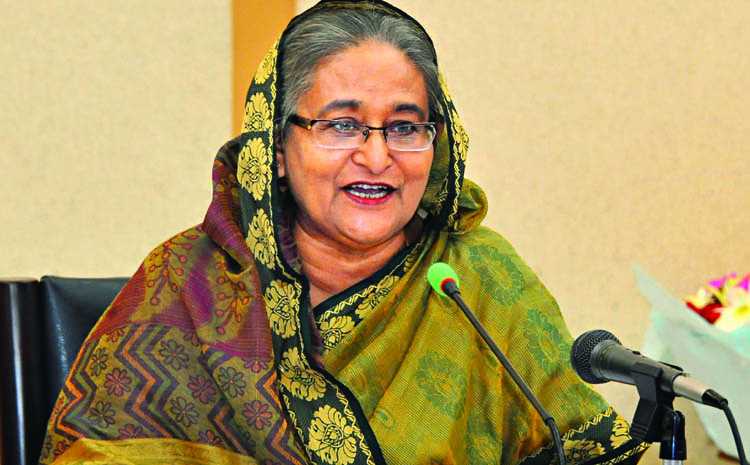GDP growth record 7.24%

Breaking all the previous records, Bangladesh's gross domestic product (GDP) growth has reached 7.24 percent this fiscal year buoyed by the robust growth in the industrial sector.
"The GDP growth in the outgoing fiscal year (FY17) reached 7.24 percent which was 7.11 percent in the last fiscal year (FY16)," said Planning Minister AHM Mustafa Kamal quoting the provisional estimate of the Bangladesh Bureau of Statistics (BBS).
Kamal was addressing a media briefing after the day's NEC meeting held at the NEC conference room in the city.He said the country had been trying very hard to raise the GDP growth to over 7 percent for the last couple of years although some civil society members and some economists were skeptical about achieving the 7 percent growth rate. "But, like the previous year, the GDP growth in this year exceeded the 7-percent mark," he added.
Bangladesh has been maintaining over 6 percent GDP growth rate on average for the last few years as the growth rate in FY13 was 6.01 percent, while it was 6.06 percent in FY14 and 6.55 percent in FY15.
As per the BBS provisional estimation, the per capita income also rose to $1,602 in the outgoing fiscal year which was $ 1,465 in the previous financial year, reports UNB. The GDP size in the outgoing fiscal year at current prices was estimated at Tk 1,956,056 crore while the GNI at Tk 2,038,041 crore.
Terming the attainment of this 7.24 percent growth an 'outstanding feat' for the country, Mustafa Kamal said no other country in the world except India could exceed over 7 percent growth in the outgoing fiscal year.He also said the government will aim to achieve a 7.4 percent GDP growth rate in the next fiscal year (FY18), while the target in FY20 will be set at 8 percent.
About the investment ratio to GDP which had long been hovering below 30 percent, the Planning Minister said the rate was 30.27 percent in the outgoing fiscal year which was 29.65 percent in the previous fiscal year.Out of this investment ratio, the bulk of 23.01 percent investment ratio to GDP was witnessed by the private sector while the rest of 7.26 percent by the public sector.
Asked why the private sector is still so shy of raising the investment to GDP ratio, he said the private sector investment is on the rise in the country. Bangladesh will one day become the 'heaven' for the private sector, he added.
When his attention was drawn to the World Bank's latest growth projection of 6.8 percent, Kamal said the Washington-based lending agency had never made such high growth projection about Bangladesh.
"There's no engineering about the country's growth estimation, and we never changed the methodology of GDP growth estimation. The World Bank had always been very conservative about our growth projection. But, I think, this time they said many good words about Bangladesh which they never said in the case of other countries," added the minister.
He said the government is planning to encourage expatriates to send their remittance through formal channels taking various measures like reducing or withdrawing service charges for remitting the hard-earned money.
He said although money is being sent to the country from abroad through Western Union Money Transfer and bKash, those are not added to the central bank calculation, for which the real picture of the remittance inflow is not truly depicted.
"The government is planning to discourage Hundi...bKash is doing business inside the country and this is recognized....we might give them recognition for sending inward remittance," he added.
He said Prime Minister Sheikh Hasina at yesterday's NEC meeting extended her heartfelt thanks to the country's people as Bangladesh gained 7.24 percent growth in the outgoing fiscal. "It's not achieved single-handedly, rather all people have partnership and cooperation to this end. The achievements have been possible because of the continuity of governance," Kamal said quoting the Prime Minister.
Asked about the growth of three major sectors, he said the industrial sector attained the highest growth of 10.50 percent in the outgoing fiscal year followed by 6.50 percent by the services sector while 3.40 percent by the agriculture sector.
Replying to another question, he said the government has undertaken all possible measures to enhance the implementation capacity of the implementing agencies. "We're moving ahead gradually after adopting necessary reform initiatives, and we're also making a significant progress."
Source: https://dailyasianage.com
Tags :
Previous Story
- Bangladesh projects 7.11 percent GDP
- IMF predicts 6.9pc GDP growth in BD
- ADB forecasts 6.9pc GDP growth for Bangladesh
- Bangladesh expecting 7.2pc GDP growth in FY17: Muhith
- Light engineering sector contributes 3% to GDP
- Bangladesh's GDP to exceed Malaysia by 2050
- Citibank hails GDP growth in Bangladesh
- Increasing tourism’s contribution to GDP